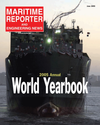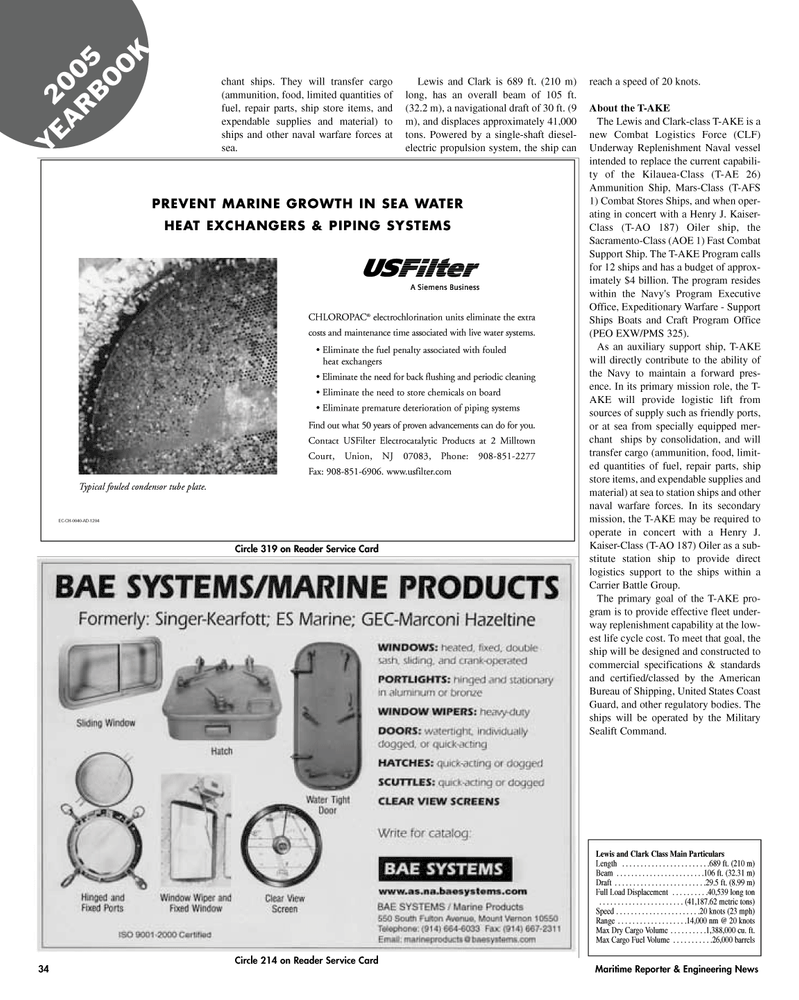
Page 34: of Maritime Reporter Magazine (June 2005)
Annual World Yearbook
Read this page in Pdf, Flash or Html5 edition of June 2005 Maritime Reporter Magazine
chant ships. They will transfer cargo (ammunition, food, limited quantities of fuel, repair parts, ship store items, and expendable supplies and material) to ships and other naval warfare forces at sea.
Lewis and Clark is 689 ft. (210 m) long, has an overall beam of 105 ft. (32.2 m), a navigational draft of 30 ft. (9 m), and displaces approximately 41,000 tons. Powered by a single-shaft diesel- electric propulsion system, the ship can reach a speed of 20 knots.
About the T-AKE
The Lewis and Clark-class T-AKE is a new Combat Logistics Force (CLF)
Underway Replenishment Naval vessel intended to replace the current capabili- ty of the Kilauea-Class (T-AE 26)
Ammunition Ship, Mars-Class (T-AFS 1) Combat Stores Ships, and when oper- ating in concert with a Henry J. Kaiser-
Class (T-AO 187) Oiler ship, the
Sacramento-Class (AOE 1) Fast Combat
Support Ship. The T-AKE Program calls for 12 ships and has a budget of approx- imately $4 billion. The program resides within the Navy's Program Executive
Office, Expeditionary Warfare - Support
Ships Boats and Craft Program Office (PEO EXW/PMS 325).
As an auxiliary support ship, T-AKE will directly contribute to the ability of the Navy to maintain a forward pres- ence. In its primary mission role, the T-
AKE will provide logistic lift from sources of supply such as friendly ports, or at sea from specially equipped mer- chant ships by consolidation, and will transfer cargo (ammunition, food, limit- ed quantities of fuel, repair parts, ship store items, and expendable supplies and material) at sea to station ships and other naval warfare forces. In its secondary mission, the T-AKE may be required to operate in concert with a Henry J.
Kaiser-Class (T-AO 187) Oiler as a sub- stitute station ship to provide direct logistics support to the ships within a
Carrier Battle Group.
The primary goal of the T-AKE pro- gram is to provide effective fleet under- way replenishment capability at the low- est life cycle cost. To meet that goal, the ship will be designed and constructed to commercial specifications & standards and certified/classed by the American
Bureau of Shipping, United States Coast
Guard, and other regulatory bodies. The ships will be operated by the Military
Sealift Command. 34 Maritime Reporter & Engineering News
PREVENT MARINE GROWTH IN SEA WATER
HEAT EXCHANGERS & PIPING SYSTEMS
CHLOROPAC ® electrochlorination units eliminate the extra costs and maintenance time associated with live water systems. • Eliminate the fuel penalty associated with fouled heat exchangers • Eliminate the need for back flushing and periodic cleaning • Eliminate the need to store chemicals on board • Eliminate premature deterioration of piping systems
Find out what 50 years of proven advancements can do for you.
Contact USFilter Electrocatalytic Products at 2 Milltown
Court, Union, NJ 07083, Phone: 908-851-2277
Fax: 908-851-6906. www.usfilter.com
Typical fouled condensor tube plate.
EC-CH-0040-AD-1204
Circle 319 on Reader Service Card 2005
YEARBOOK
Lewis and Clark Class Main Particulars
Length . . . . . . . . . . . . . . . . . . . . . . . .689 ft. (210 m)
Beam . . . . . . . . . . . . . . . . . . . . . . . .106 ft. (32.31 m)
Draft . . . . . . . . . . . . . . . . . . . . . . . . .29.5 ft. (8.99 m)
Full Load Displacement . . . . . . . . . .40,539 long ton . . . . . . . . . . . . . . . . . . . . . . . (41,187.62 metric tons)
Speed . . . . . . . . . . . . . . . . . . . . . . .20 knots (23 mph)
Range . . . . . . . . . . . . . . . . . . .14,000 nm @ 20 knots
Max Dry Cargo Volume . . . . . . . . . .1,388,000 cu. ft.
Max Cargo Fuel Volume . . . . . . . . . . .26,000 barrels
Circle 214 on Reader Service Card
MR JUNE 2005 #5 (33-40).qxd 6/3/2005 9:02 AM Page 34

 33
33

 35
35
